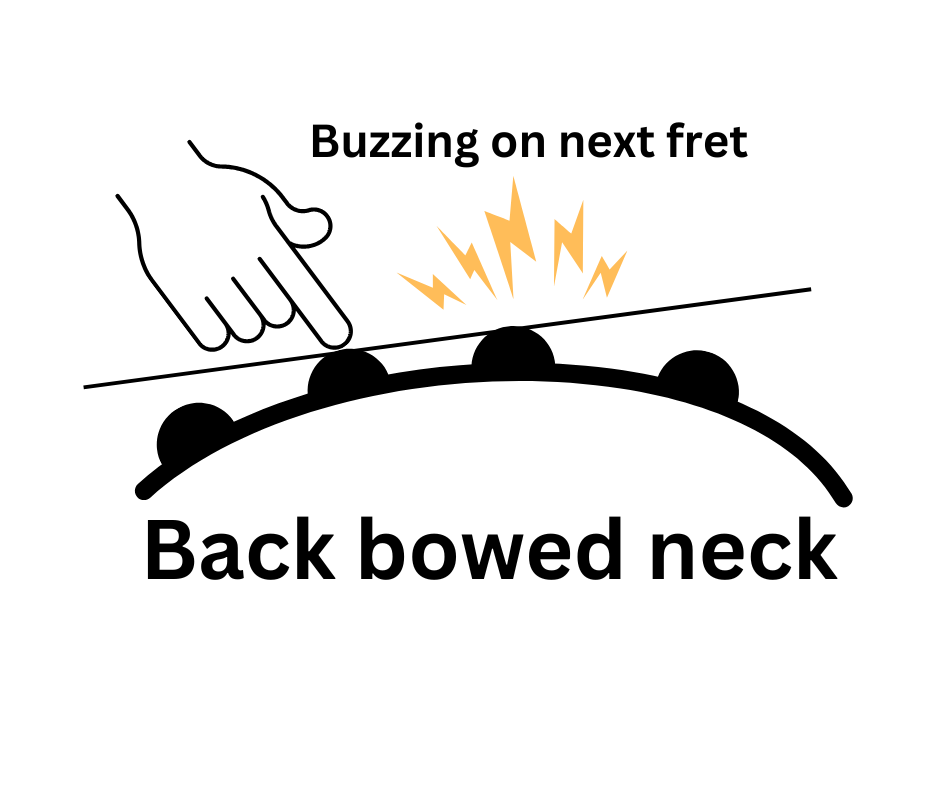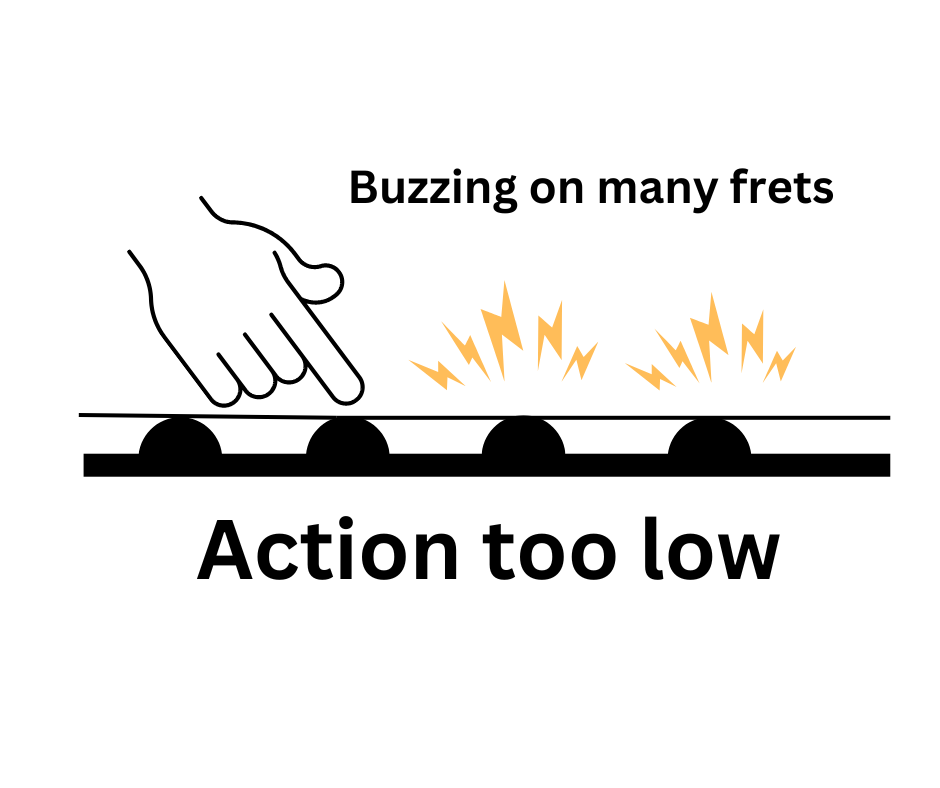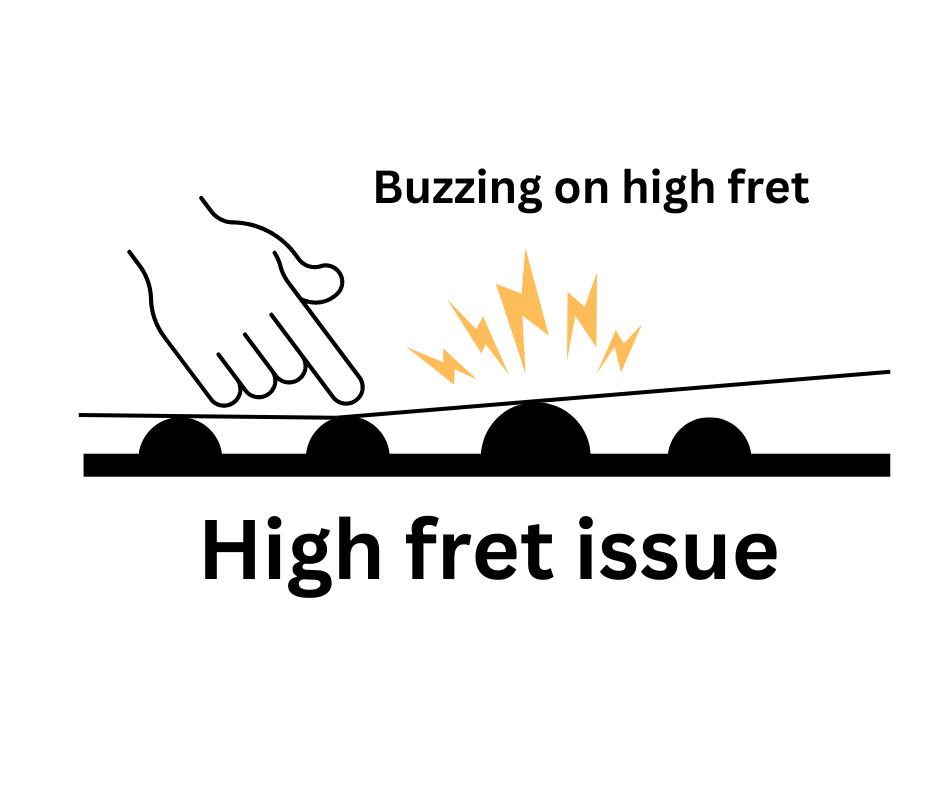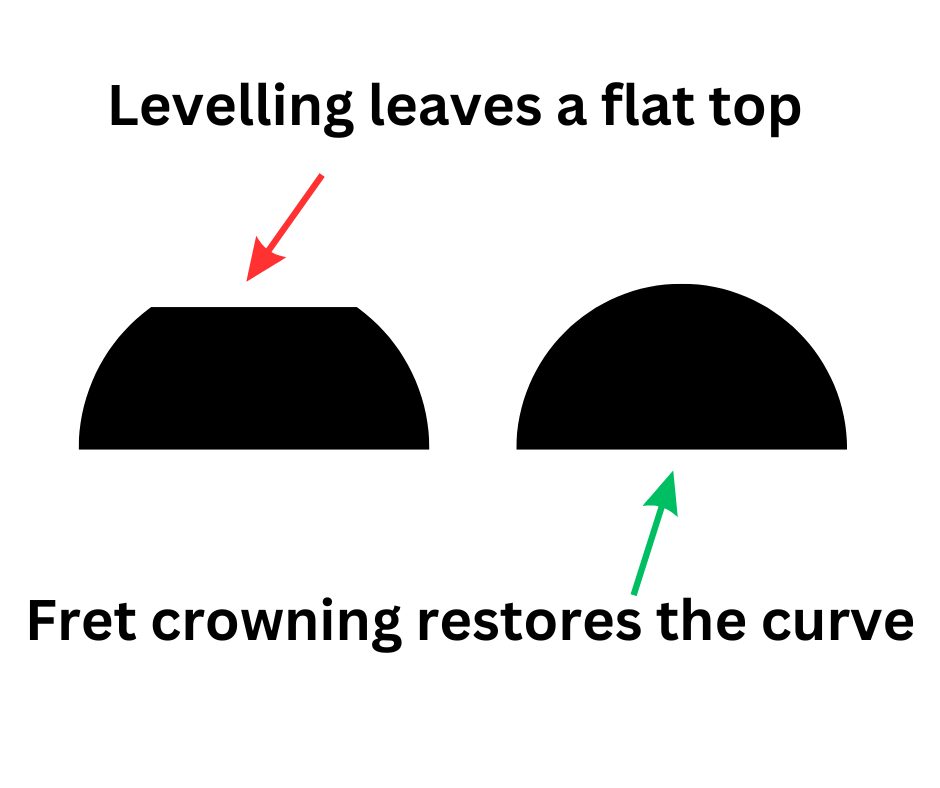We’ve all been there – you’re in the groove, playing your favourite riff, when suddenly you hear it: that annoying fret buzz that makes your perfect tone sound more like an angry bee trapped in a jar.
Fret buzz can be incredibly frustrating, turning what should be a smooth jam session into an exercise in musical pain!
Buzzing frets can completely ruin the enjoyment of your guitar or bass, and is one of the most common complaints I see when someone is bringing their instrument in for a set up.
Don’t worry though, fret buzz is easily fixed in most cases – so lets talk about what causes it, and how to fix it.
What Exactly is Fret Buzz?
You know that metallic rattling sound you hear when playing certain notes? That’s fret buzz.
You push down on a note, strum it and it sounds like a snare drum(!).
It happens when your guitar string vibrates against the other metal frets instead of clearing the height cleanly over them.
Not only does it sound bad, but it can seriously mess with your playing, causing notes to sound dead or choked and robbing your guitar of its natural sustain.
Think of it like this: your guitar strings should be like a tightrope walker performing high above the frets – close enough to do their job, but not so close that they’re stumbling on the platform below.
There 3 main causes of fret buzz. So let’s go through each one so you understand why your fret are buzzing, along with the steps you can take to remedy them (of course at Stu’s Guitar Setups, I’d be happy to help if you don’t feel confident doing it yourself 🙂 ).
1. Fret buzz caused by a back bowed neck
Your guitar or bass can have varying degrees of ‘bend’ to it.
On one extreme you can have too much relief, meaning the neck sinks down in the middle – like a ‘U’ shape (obviously not quite as extreme as a U(!).
It can be dead straight – or in the case of fret buzz it can have a back bow. This means the neck is more ‘n’ shaped. With the middle of the neck being higher than either end.
When this happens, this will lead to buzzing frets because when you fret a note, the next frets along will be higher (due to the back bowing of the guitar neck). This causes the string to rest on the frets that are next down the next – creating that horrible fret buzz.

How to Fix Fret buzz caused by a back bowed neck
In order to solve this issue, we simply need to change the curvature of the neck. Remove the back bow and add some relief.
To remove the back bow, you will need to loosen off your truss rod.
A back bow is caused by the truss rod being tightened too much – pulling the neck back.
Back bow could also occur ‘naturally’ if you changed your string gauge to a lighter set (for example moving from 10s to 9s) as the string tension will be less on the lighter set – so they are not pulling the neck ‘forward’ as much as the heavier set were.
To loose your truss rod, remove the truss rod cover on your instrument, insert the correct size allen key (it MUST be the right size or you risk stripping it, then you have a BIG problem) and turn it to the left.
Remember the old saying – ‘lefty loosey, righty tighty’.
Start with small adjustments – a quarter turn at a time, and check how the guitar is playing before adjusting the truss rod further.
Once you have got rid of the back bow, you should find your frets stop buzzing (yay).
There are tools that can help you see what is happening on the neck – like a notched straight edge. However, these can be expensive – and if this is not something you are doing all the time, may not be worth the investment.
Now I know not everyone is comfortable using their truss rod, and also may not have the right tools – if that sounds like you, don’t worry just drop me an email and I can help you.
2. Fret buzz caused by having action set too low
Now this is the one people don’t like hearing about…
Everyone seems to love having the lowest possible action (after all, it does feel nice a slinky to play a low action).
But there was an important word there. The lowest possible action.
The reality is, all guitar and bass necks are different (each piece of wood is unique!) – so it’s simply not the case that every instrument can have exactly the same action, and play the same way.
When your action is set too low, it means when you fret a note, the string will lay across the frets that come after it, creating the dreaded fret buzz.

How To Fix Fret buzz caused by having action too low
Well this is a really simple fix, and one you should easily be able to do at home.
You just need to raise the action!
This doesn’t necessarily need to be a massive increase in height – like with the truss rod, just make tiny adjustments and then recheck how it’s playing.
Usually we are talking fractions of a millimeter increases to resolve the problem and get rid of the buzzing frets. Of course issues like this are one of the many reasons your guitar or bass can benefit from a full set up.
3. Fret Buzz Caused By High Frets
So if the other issues have been looked at – you don’t have back bow in the neck, and your action is set to a realistic (…) level – then there is one more reason you can be getting fret buzz.
You have some frets higher than the other.
The effect of this is the same as the back bow situation – when you fret a note before the high fret, it makes the string lay on the high fret leading to your fret buzzing when you play.

How To Fix Fret Buzz Caused By High Frets
The solution to this issue is perhaps not that ‘DIY friendly’ as you will need to do some fret levelling.
The high frets will need to be filed down to the correct height. This will leave a flat top on the fret – which will then need to be recrowned so that it has a nice curved top again.

Fret levelling requires some very specific tools – and a lot of practice(!).
In my opinion this is definitley when you need to be calling a guitar tech (like me!) to help you out.
No more fret buzz!
So there you have it, the 3 main reasons your frets will be buzzing – but as I hope you’ve learnt, this is not something you have to put up with. Buzzing frets can be easily got rid of.
And don’t forget once you’ve got rid of the buzz, it best to make sure you’ve polished the frets to a mirror shine 🙂
The 1st step it diagnosing which of these 3 issues is causing the fret buzz, then just take the appropriate step to make it disappear 🙂
Of course if you don’t feel comfortable doing this yourself, just give me a shout and I can help you 🙂
Cheers Stu
